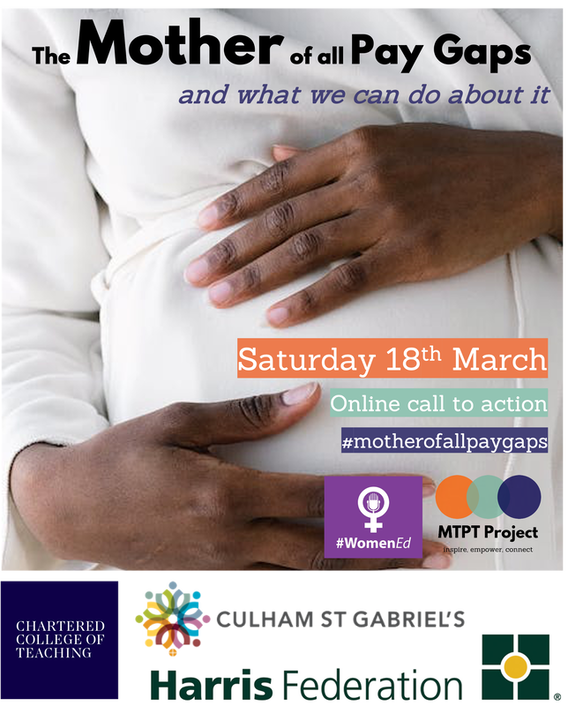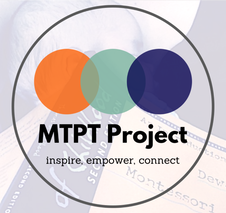 Scheduled the day before Mothering Sunday, The Mother of All Pay Gaps 2023 conference on Saturday 18 March 2023 was intended to be a practical gift to mothers. Organised by The MaternityTeacher PaternityTeacher Project (The MTPT Project) and WomenEd, over 60 school leaders and teachers with experience of parenthood or currently on maternity/paternity leave attended the whole day. Irrespective of delegates’ roles in schools, and/or the wider education ecosystem, the conference was opportunity to take practical action to address the fiscal motherhood penalty and to consider systematic change that school leaders could implement from the inside in order to take steps towards solutions. The education sector has one of the worst gender pay gaps of all UK industries and motherhood is one of the most significant contributors to this injustice. The #WomenEd's Gender Pay Gap report published in 2021 by WomenEd, National Governors’ Association, ASCL and NAHT, revealed that the gender pay gap widens at every level for teachers and leaders aged 35 - 39 years. Crucially for both mothers and the teaching profession, this is the age that teachers are most likely to become mothers and when they are most likely to leave the profession. Otherwise known as the motherhood penalty. Emma Sheppard, founder of The MTPT Project led one of the morning keynotes, contextualising and outlining the problem of the mother pay gap, and followed up in the afternoon keynote contextualising education within the wider industries; as well as considering flexible working, equal parental pay, and women’s contribution to the labour force, whether working or not. Compared to other sectors, is education a worse situation for parents. Or is it the case for everyone as a national, social and political issue? Evidence shows variations across all industries with comparative parental leave pay. For example, Aviva became one of the first UK employers to introduce an equal parental leave policy, offering new parents in its UK business 12 months’ parental leave, with six months at full basic pay. John Lewis, has an equal parenthood leave that provides all new parents 26 weeks paid leave (14 weeks at full contractual pay and 12 weeks at 50% contractual pay). However, nationally, 31% of employers only offer the statutory six weeks’ parental leave pay. So, parents in education would seem to be comparatively better off. But, as another example, London Fire Brigade[1] has a more generous maternity leave policy; although it is fair to say that it is a very male dominated profession with fewer mothers to support. Vivienne Porritt, Co-Founder and National Leader of WomenEd led the keynote on the gender pay gap. Evidence shows that by retirement, female Headteachers aged 60 across all types of state-funded schools are over £17,000 per year worse off than their male counterparts; which can start from motherhood. Women’s salaries generally have steadier increases in salary by age; whereas men tend to see much larger increases, particularly towards the end of their career and this discrepancy is getting worse. As a collective call to action therefore, the conference workshop sessions were designed with “a what to do” focus, moving on from the problem towards practical and concrete solutions by seeking to change policies and to empower others. For example, providing practical advice on how to fill in shared parental leave documentation. Other speakers included Kinza Barrett, founder of Shared Parental Leave for Teachers who provided insight into how to add shared parental leave to holidays; which is not always possible in education and financially, can make a big difference for families. For example, in saving up for childcare and notably, it is a legal right. Popular workshop sessions included The MTPT Project coach Malarvilie Krishnasamy’s Question Time panel on The Power of Coaching and Head of History and Assistant Headteacher at Vyners School Academy Trust, Simon Beale’s talk on What Can Fathers Do. Allyship from fathers is essential; not least in sharing childcare logistics. Typically, there is a chain effect. Mothers often take on more of the pick-up/ drop-offs of their children and the domestic load, which inevitably increases as babies create more work; because they are generally afforded longer maternity leave and get into better routines than fathers. So, when mothers go back to work, they may benefit from better routines, but they are nevertheless having to manage greater professional and domestic workloads. But by taking shared parental leave, fathers can also benefit from developing their own routines at home, so that both parents enjoy greater equity in their shared systems. Another useful what to do session was Negotiating Your Worth in upskilling how to negotiate. Even if there is no budget or new parents are unable to return to work on a part-time basis, they can still negotiate for time to work from home or to work flexibly and thereby save money on paying for a nanny and/or breakfast clubs because of an early work start. Other workshop sessions that were well received included the Power of Coaching, Shared Parental Leave for Holiday Pay, Full Time and Thriving, Mentoring and Role-Modelling for Mother-Teachers, "No"-ing Your Worth: Setting Boundaries for Unpaid Labour, Maternity Pay Policies, Fair Pay for Flexible TLRs and CPD and Progression for Mother-Teachers and The MTPT Project and WomenEd thank the contributors for sharing their expertise and experiences: Kathleen Cushnie, Deputy Head and Voicing Education Podcast Host, Emma Blake, Trust Lead Practitioner and WomenEd Network Lead, Chris Reddy, Coach and Founder of Bright Leaders, Abby Bayford, Executive Director of GAT Institute of Teaching, Lindsay Patience, Co-Founder of Flexible Teacher Talent and Bridget Clay, author of Unleashing Great Teaching and Director of School Leadership at Teach First. WomenEd and The MTPT Project also thank the delegates for attending and sharing their experiences. Feedback was optimistic and enthusiastic with personal commitments to bring back change to schools in order to support others. WomenEd and The MTPT are grateful to Ambition Institute, Culham St Gabriel's Trust, The Chartered College of Teaching and Harris Federation for sponsoring this free event and for their commitment to addressing the motherhood penalty in education. Too often women are asked to do things for free, as a gesture of goodwill (the “guilt martyr” approach) or to do it for “the children” or “the community” and it was important to the organisers that all the speakers and keynotes were paid and valued for their presentations. Commenting on this début Mother of All Pay Gaps Conference, Emma Sheppard, founder of The MTPT Project said: “It was a great day! As well as a sense of togetherness, there was a positive feeling of our parental community and a particularly lovely characteristic was how several of our session leads and panel guests were talking and delivering with their babies on their laps having a feed! Thank you to everyone.” Finally, save the date for next year’s conference! Saturday 9 March 2024, again, beautifully timed the day before Mothering Sunday. [1] (a) Up to 12 months maternity leave, of which the first 26 weeks will be ordinary maternity leave (OML) and the remaining 26 weeks will be additional maternity leave (AML). (b) OML which will be paid at a rate of 15 weeks at full pay and 11 weeks at half of normal pay. (c) AML which will be paid at a rate of 13 weeks at half of normal pay. The remaining 13 weeks will be unpaid. Report by Jude Owens, PA to the SWIFT Executive Team For more information
0 Comments
Your comment will be posted after it is approved.
Leave a Reply. |
SWIFT News
|
SPONSORED BY
Join us, be a part of our SWIFT community |
© COPYRIGHT 2022 SOUTH WEST INSTITUTE FOR TEACHING SWIFT. ALL RIGHTS RESERVED | Website by brightblueC
VIEW OUR PRIVACY NOTICES | VIEW OUR COURSE T&CS
VIEW OUR PRIVACY NOTICES | VIEW OUR COURSE T&CS



 RSS Feed
RSS Feed





